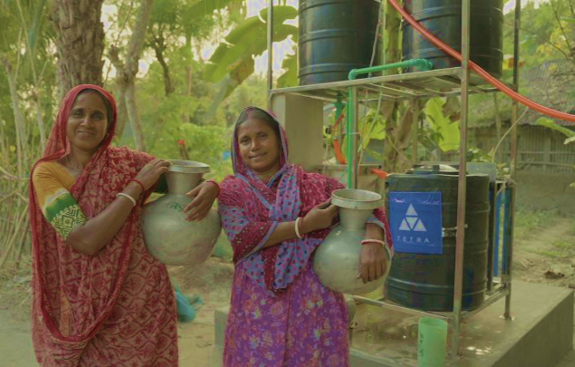Mubasshir Tahmid, Managing Director, Tetra
Marium begins her journey at 9:45 AM every day to a desalination plant 2 kilometers away from her home. She balances an empty pitcher on her hip and begins walking. The plant, operated by a large organization, opens at 10:00 a.m., and by the time she arrives, there is already a long line of women waiting. She waits patiently for her turn, collects the water, and begins the arduous trek back home. By the time she returns, it is almost 11:00 AM, and her day is half over. On days when Marium cannot make the trip because she needs to care for her toddler, her 12-year-old daughter, Ayesha, takes her place. The desalination plant operates only from 10 a.m. to 1 p.m., forcing Ayesha to miss school. This routine disrupts her education and adds another burden to the family. For families like Marium’s, the daily grind of fetching water is not just exhausting but also damaging—to their health, education, and well-being.
Fatema’s story is another sobering reminder of how dangerous the water crisis can be. Pregnant with her second child, Fatema relied on saline-contaminated water for her daily needs. One day, she collapsed at home. At the hospital, doctors told her that the high salt content in her regular water intake had triggered complications, leading to a miscarriage. Fatema’s heartbreak is not an isolated incident; health crises caused by saline water are alarmingly common in the southern coastal belt.
Marium and Fatema’s stories are just two among millions. In the southern coastal belt of Bangladesh, 43 million people suffer from the consequences of water salinity. Rising sea levels and frequent cyclones have worsened the problem, pushing saline water further inland and contaminating traditional freshwater sources.


Many women in Khulna, Shatkhira, Bagerhat and other coastal districts travel long distances everyday to collect water
For years, attempts to solve this crisis have met with limited success. Large-scale water treatment plants have been built, only to be abandoned later. When these plants are handed over to communities, they often fail due to technical difficulties faced by the community and a lack of proper training. Further, the community members often feel no incentive to maintain the plants as no individual incentive mechanism is present, and the principle of “everyone owns it, no one takes ownership” leaves the infrastructure to decay. These failures highlight the need for solutions that are not just innovative but sustainable and community-driven.
Tetra’s Revolutionary Approach: The Women Microentrepreneurship Model
Tetra, a social enterprise born out of a vision to tackle water scarcity, is redefining how communities in the southern coastal belt access safe drinking water. Founded by a group of passionate innovators, Tetra focuses on providing affordable, user-friendly, and environmentally sustainable solutions for water purification. Over the years, Tetra has supported hundreds of households by leveraging technology and empowering marginalized groups, particularly women, to become change-makers in their communities.
At the heart of Tetra’s mission is the Women Microentrepreneurship Model. This approach trains women in the operation and maintenance of solar-powered desalination units that are financed, installed, and supervised by Tetra. Under Tetra’s guidance, these women are equipped with the skills to run small water enterprises. By turning women into entrepreneurs, Tetra not only ensures the sustainability of its water solutions but also empowers women with financial independence and leadership roles.
These solar-powered desalination units are designed to be eco-friendly, low-cost, and efficient. They transform saline water into safe drinking water, addressing the immediate needs of families in vulnerable regions. Women entrepreneurs, trained and supported by Tetra, sell the purified water to their neighbors at an affordable price which is set by Tetra. These plants of Tetra are autonomous and dispense water through pre-recharged water ATM cards and a solar-powered water ATM system. Microentrepreneurs need to only conduct weekly light maintenance and recharge the water ATM card of the users collecting their payments. This unique system allows the busy homemakers of low-income households to build their own water enterprises. This creates a self-sustaining model where the income generated incentivizes proper maintenance of the units, Tetra remains informed about the performance of the plants and can extend technical support when necessary. Together, Tetra and microentrepreneurs ensure long-term community access to safe water.
This focus on local ownership and empowerment makes Tetra’s approach particularly unique in the context of coastal Bangladesh. Traditional solutions often falter due to external reliance and lack of community involvement. Tetra’s model flips this narrative by embedding the solution within the community itself. Women entrepreneurs are not only the operators but also the stakeholders, ensuring that the system remains functional and relevant. This emphasis on grassroots involvement makes it a standout example of locally led adaptation.

Clients collecting water from a Tetra water purification plant
Beyond its immediate impact, Tetra’s model has far-reaching implications. It provides a scalable blueprint for addressing water scarcity in other climate-vulnerable regions. By demonstrating how local communities can drive and sustain solutions to their challenges, Tetra is contributing valuable evidence to the global discourse on climate resilience. Policymakers, researchers, and development practitioners can leverage these lessons to replicate and adapt similar models in regions facing comparable challenges.
By combining technology, sustainability, and community empowerment, Tetra is creating a blueprint for tackling water crises in climate-vulnerable regions. With continued support, this model can reach millions more, ensuring that safe water becomes a reality for all.
Share your email with us, and we’ll reach out with updates and insights.
© 2025 Tetra Private Limited. All rights reserved.